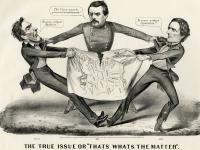Presidential elections tend to stir up heated debates, mixed emotions, and increased political participation. Today, we hold rallies to show support for the candidate of our choice, but what did people do during the Civil War? The Presidential election of 1864 was the first to be held during a time of war and it resulted in a heated battle between the incumbent and his challenger.
This lesson will look at Emilie Davis’ account of the 1864 elections, as well as the propaganda surrounding the election and campaign strategies. Students will see a variety of primary sources relating to this turbulent year in history and assess how things have changed, or have not changed, in the past 150 years.


